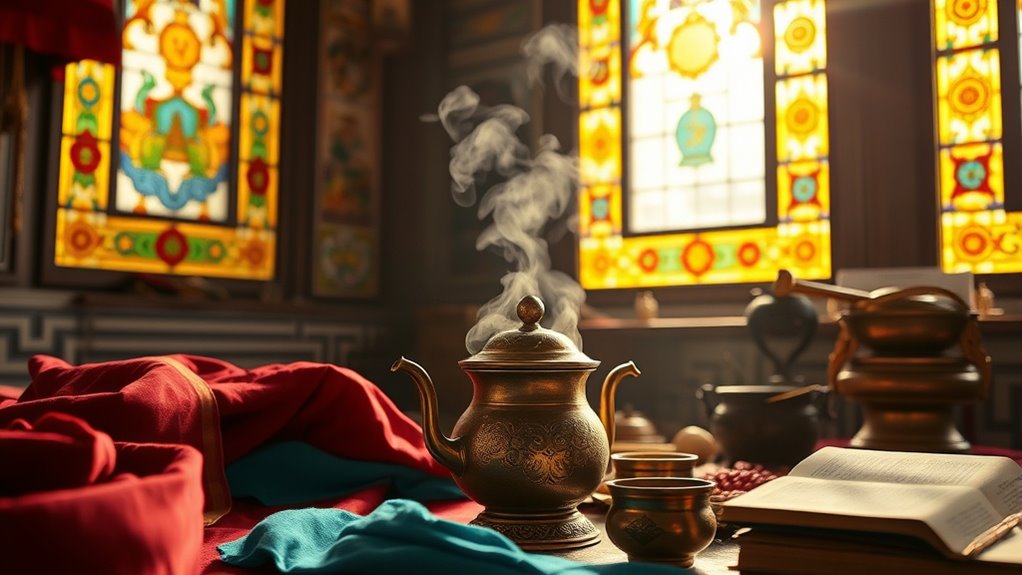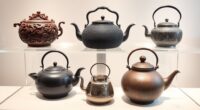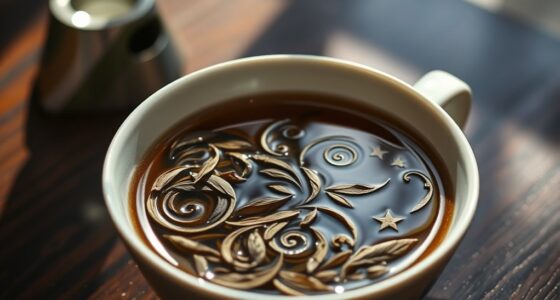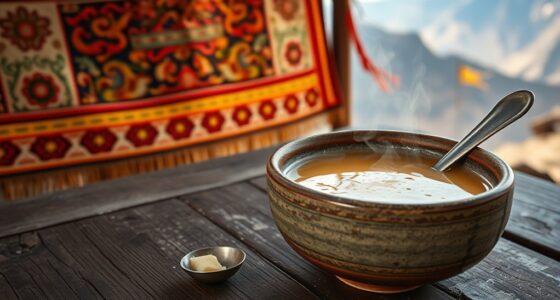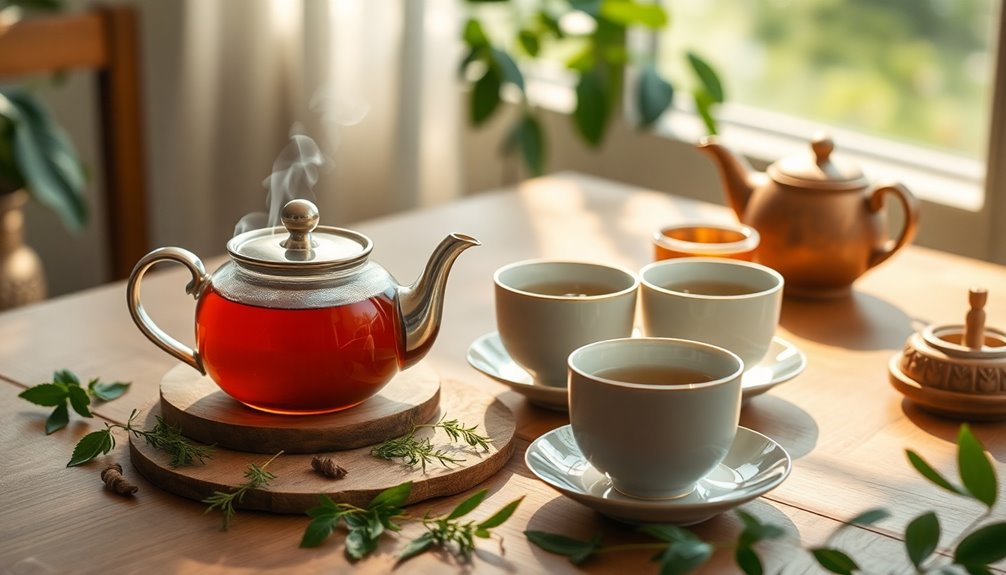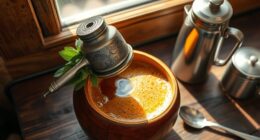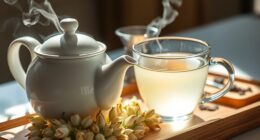In Tibetan monasteries, tea symbolizes mindfulness, spiritual connection, and devotion. When prepared and offered with reverence, it becomes a sacred ritual that purifies spaces and invites blessings. Sharing tea fosters unity among practitioners and reinforces a sense of interconnectedness. It also supports focus and calm during meditation and prayer. If you look closer, you’ll discover how tea integrates into daily practices, strengthening your understanding of Tibetan spiritual traditions.
Key Takeaways
- Tea symbolizes spiritual connection and mindfulness, aiding practitioners in deepening their understanding of the divine.
- Preparing and offering tea is a sacred ritual imbued with reverence, purification, and deliberate mindfulness.
- Tea acts as a devotional offering to deities and spiritual teachers, representing respect and surrender.
- Sharing tea during communal gatherings fosters unity, compassion, and collective consciousness among practitioners.
- The calming and aromatic qualities of tea enhance focus, serenity, and connect monks to centuries of spiritual tradition.
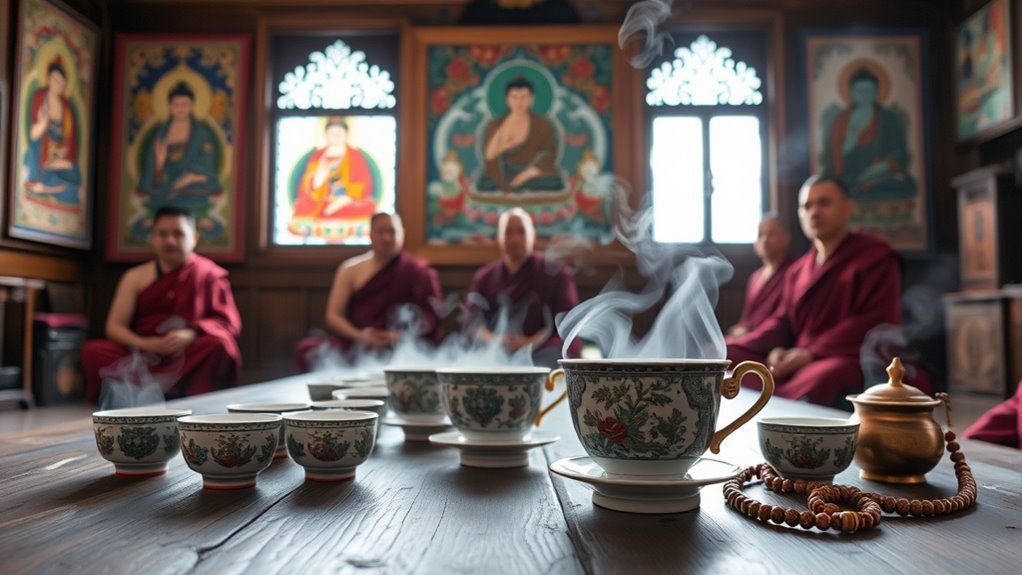
Tea has long been celebrated not just as a soothing beverage but also as a symbol of spiritual connection and mindfulness. In Tibetan monasteries, it holds a special place within practices that deepen your understanding of the divine and foster inner peace. When you participate in meditative rituals, tea often becomes more than just a drink; it transforms into a tool that helps you center your mind and cultivate awareness. These rituals are carefully crafted, blending tradition and intention, where each sip supports your journey toward enlightenment. During such practices, tea is often used as a form of ritual offerings, symbolizing respect, gratitude, and the surrender of ego. Offering tea to deities or spiritual teachers isn’t just about politeness; it’s a gesture that signifies your devotion and recognition of the sacred within everyday acts.
In Tibetan monasteries, the act of preparing and offering tea is imbued with ritual significance. You might see monks or practitioners carefully boiling water and mixing herbs, creating a brew that’s both nourishing and spiritually potent. As you observe or participate, you realize that these actions are deliberate, each step performed with mindfulness and reverence. The ritual offerings of tea serve to purify the space, invite blessings, and establish a sacred connection between the physical and spiritual worlds. When you bring tea into meditative rituals, it becomes a symbol of unity—linking your body, mind, and spirit through the act of mindful preparation and offering. It’s not merely about quenching thirst but about creating a sacred atmosphere conducive to introspection. Additionally, the analgesic properties of tea can help soothe any physical discomfort during prolonged meditation, enhancing your focus and serenity.
The significance of tea in Tibetan spiritual practices extends to its role in communal gatherings, where sharing tea fosters a sense of unity and collective consciousness. You might notice that during spiritual ceremonies, the act of offering and receiving tea creates a reciprocal exchange rooted in humility and respect. This ritual reinforces the bonds among practitioners and reminds you of the interconnectedness of all beings. The calming nature of tea helps steady your mind, making it easier to focus during prayer or meditation. Its warmth and aroma serve as gentle reminders of compassion and mindfulness, qualities essential to Tibetan spiritual tradition. Ultimately, tea in these settings is more than a beverage; it’s a sacred symbol that nurtures your spiritual growth, grounding you in the present moment while connecting you to centuries of tradition and divine energy.
Frequently Asked Questions
How Is Tea Prepared During Tibetan Spiritual Ceremonies?
During Tibetan spiritual ceremonies, you prepare tea using specific brewing techniques that emphasize mindfulness. You start by boiling water and using ceremonial tea utensils, like a traditional teapot and cups, to honor the process. The tea, often butter tea or yak milk tea, is brewed slowly to enhance its spiritual significance. This careful preparation reflects respect and devotion, turning a simple act into a meaningful ritual that connects you with Tibetan spiritual traditions.
Are Specific Types of Tea Considered More Sacred?
You might think all teas are equal in Tibetan monasteries, but surprisingly, sacred tea varieties hold a special place. While tea brewing traditions are respected, certain types are considered more sacred, symbolizing spiritual purity and devotion. These sacred varieties aren’t just for drinking—they’re part of rituals, embodying the essence of spiritual practice. So, yes, specific teas are treasured, elevating a simple brew into a divine offering.
Do Monks Have Daily Tea Rituals Outside of Ceremonies?
You might wonder if monks have daily tea rituals beyond ceremonies. In their monastic routines, tea consumption is often a simple, mindful activity that helps them stay alert and focused. While not elaborate, these daily moments of drinking tea serve as a form of meditation or reflection, reinforcing discipline and community. So, yes, monks do incorporate tea into their everyday lives, blending practical needs with spiritual practice.
What Symbolic Meanings Are Associated With Tea in Tibetan Culture?
You might find that in Tibetan culture, tea symbolism goes beyond just a beverage; it represents hospitality, respect, and community. Tea’s cultural significance is deeply rooted in social interactions, welcoming guests, and fostering unity. When you share tea, you’re participating in a tradition that emphasizes warmth and connection, reflecting core Tibetan values. This ritual underscores how tea embodies much more than taste—it’s a symbol of harmony and cultural identity.
How Does Tea Consumption Influence Meditation Practices?
You find that tea consumption enhances your meditation focus by promoting calmness and alertness. With tea mindfulness, you stay present and centered, making it easier to deepen your practice. Drinking tea before meditation helps clear your mind, reduce stress, and create a tranquil environment. As a result, your meditation becomes more effective, allowing you to connect more deeply with your inner self and the spiritual journey you’re pursuing.
Conclusion
As you sip tea in Tibetan monasteries, remember it’s more than just a warm drink—it’s a bridge to spiritual awakening. Like a gentle river guiding you through still waters, tea nourishes your mind and soul, fostering mindfulness and connection. Embrace each cup as a sacred moment, a reminder that serenity flows from simple acts. In this ritual, you find the quiet strength to align your spirit and elevate your journey toward enlightenment.

